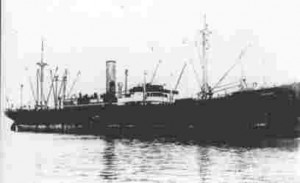WWI Stories – Archibald Forrester Wallace and the First Shot
Jessie Boudrie shares a personal anecdote of the first shot fired in WWI.
 Quite a few years ago my mother read with great interest an article in the Herald Sun about the first shot that was fired in World War I. It brought back memories from her childhood of her father’s involvement. We sat down with a cup of tea and she told me the story.
Quite a few years ago my mother read with great interest an article in the Herald Sun about the first shot that was fired in World War I. It brought back memories from her childhood of her father’s involvement. We sat down with a cup of tea and she told me the story.
Her father, Archibald Forrester Wallace was an Engineer at the Dockyards in Williamstown. He and my grandmother Jessie with their three children Archibald, Jessie, my mother and Alexander had arrived from Scotland the previous year. During 1914 rumours were rife of an impending conflict between England and Germany but to my mother at the age of thirteen any thought that it might affect her family was of little consequence, after all they were on the other side of the world.
On the evening of Wednesday 5 August she sat down with her mother and brothers to their evening meal. Her father was always home by this time but when he had not arrived by the time the meal was on the table they assumed that he was working overtime.
In the preceding days a hurried refit was being carried out on the HMAS Pioneer, a light cruiser which was acting as the guard ship for Port Phillip Bay. She was now being prepared for duty outside Australian waters. As the evening wore on there were dishes to be washed, and homework to be done, but still her father had not come home. She could see how worried her mother was becoming although she was trying to keep it from her children. Late into the night they sat around the kitchen table waiting for the sound of his key in the front door.
At last her mother ordered them all off to bed, “It was no use them all staying up and worrying anyway tomorrow was a school day”. When my mother got up the next morning it was obvious that my grandmother had not been to bed and had sat up all night and that there had not been any word.
They ate breakfast and although protesting they were shooed off to school. On their return that afternoon they were very relieved to find their father at home. They excitedly clustered around him and he told them of the events of the previous day.
He had been part of the group of workers on board ship during sea trials when word spread among the men that war had been declared and that a German ship had tried to escape through the Heads. Rumors circulated that the enemy ship had escaped, others that she had been captured and that they were racing to the Heads to escort her back. Gradually news filtered through to those below decks of the drama that had been played out during the morning as the SS Pfalz under the command of Captain Kuhiken strove to clear Port Phillip Bay before the official declaration of war. Around noon, after the Pfalz had been cleared to proceed through the Heads, the signal that war had been declared by Britain was relayed to the Fort at Point Nepean. She was ordered several times to stop, when she did not the order was given to “stop or sink” and a warning shot was fired over her bows from the port. The Pfalz was brought back into Hobsons Bay and moored off Williamstown in the late afternoon. A guard of ten marines was then put on board. All through the night the Pioneer stood guard over the Pfalz armed and ready for any event.
My grandfather and the other workmen had no way of getting ashore or sending a message to their families until the emergency was over. They spent a sleepless night below decks not knowing at that time they were playing a part in the saga of the first shot to be fired in World War I.
As a postscript, the Pfalz was subsequently renamed HMAT Boorara, becoming a transport ship which conveyed Australian troops to and from Europe throughout the war. In May 1917, nearly three years after it was involved in the war’s first angry shot, it transported (among others) a draft of reinforcements from the famous Victorian Light Horse Regiment.
In what represents another family link with the ship, one of the soldiers ultimately became my mothers first husband.





